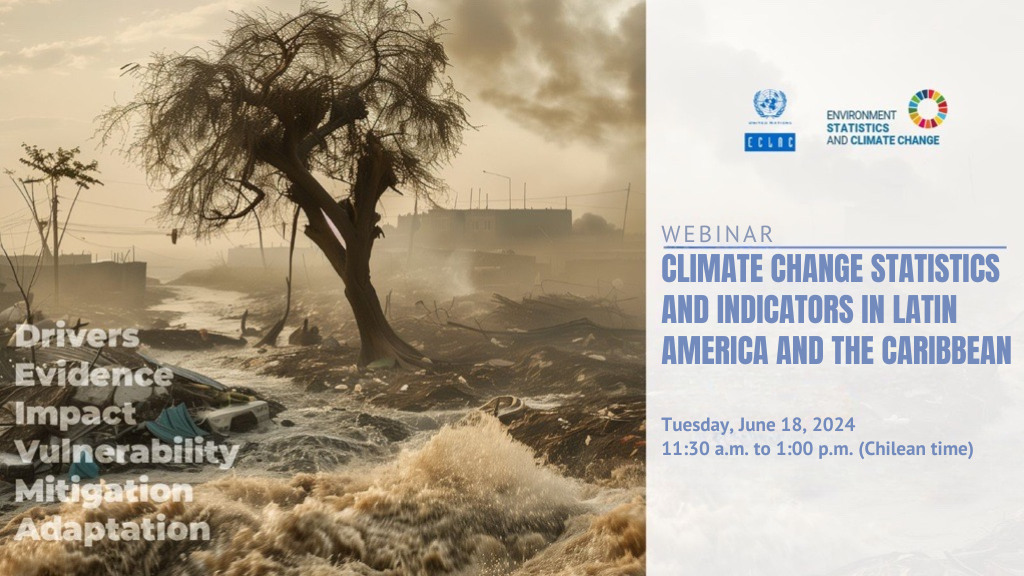Webinar on climate change statistics and indicators in Latin America and the Caribbean
Work area(s)
Teaser
The region faces droughts and floods, affecting food security and the economy. Environmental statistics in Latin America and the Caribbean require inter-institutional collaboration. They are crucial for the 2030 Agenda, but insufficient. This seminar seeks to improve the resilience of statistical systems with innovative data and modern technologies, reviewing advances and challenges in climate change statistics.
Event information

Date
18 Jun 2024, 07:30 - 09:00Event type
Introduction
Environment statistics are an emerging and cross-cutting area requiring inter-institutional collaboration for their production in Latin America and the Caribbean. Having environmental statistics and indicators is vital for monitoring the 2030 Agenda. However, its production is insufficient to meet the region's growing demand. Our region certainly faces numerous challenges, many of them associated with climate change. There is evidence of impacts such as droughts, floods, storms, sea level rise, changes in precipitation, and temperature patterns. These phenomena can have devastating consequences for food security, public health, infrastructure, and our region's economy. For this reason, we consider it appropriate and necessary to have this opportunity for dialogue to deepen the discussion and exchange of opinions.
This webinar is coordinated by the Environment Statistics, Climate Change and Disasters Unit of ECLAC's Statistics Division for our member states in the region and is part of the activities of workstream 2.1 "Statistics related to climate change and disasters" of the project "Resilient and agile national statistical systems to respond to post-COVID-19 data needs to recover better", under tranche 14 of the United Nations Development Account.
General Objective
Increase the resilience and agility of national statistical systems (NSS) to respond to new economic, social, and environmental data needs in times of crisis and disaster using innovative data sources, advanced data acquisition methods, and modern technologies while ensuring a pathway toward achieving the 2030 Agenda for Sustainable Development.
Specific Objectives
- To review the state of the art, progress, and challenges of environment statistics, indicators, and accounts, climate change and disasters in the Latin American and Caribbean region.
- To present the Global Set of Climate Change Statistics and Indicators adopted by the United Nations Statistical Commission.
- To show some experiences of indicators and statistics related to climate change and disasters in the region.
Programme of work
Welcome Remarks
Rolando Ocampo, Director of Statistics Division of ECLAC
State of the art of environmental and climate change statistics and indicators in Latin America and the Caribbean
Presentation(s)
Global set of climate change statistics and indicators
Presentation(s)
Conjunto mundial de estadísticas e indicadores sobre cambio climático
Global Set of Climate Change Statistics and Indicators
Experiences in the region
Presentation(s)
Indicadores sobre cambio climático y desastres en los Pequeños Estados Insulares en Desarrollo (PEID) del Caribe
Perú: Avances en indicadores de cambio climático y cuentas ambientales
Closing Remarks
Georgina Alcantar, Environment Statistics, Climate Change and Disasters Unit of Statistics Division of ECLAC
Practical information
| Plataforma de conexión/Connection platform: |
ZOOM |
| Fecha/Date: | 18 Jun 2024 |
| Hora/Time: | 11:30 - 13:00 hrs. UTC-4 Chile Standard Time (CLT) |
| Idioma/Language: | Español (interpretación simultánea) / English(simultaneous interpretation) |
| Nota/Note: | Para pruebas de conexión, la sesión estará disponible 60 minutos antes de la hora de inicio programada. For connection testing, the session will be available 60 minutes before the scheduled start time. |
Organizing institution
Economic Commission for Latin America and the Caribbean (ECLAC)
- https://www.cepal.org
- 56 222100000
Contact
División de Estadísticas
- estadisticas@cepal.org